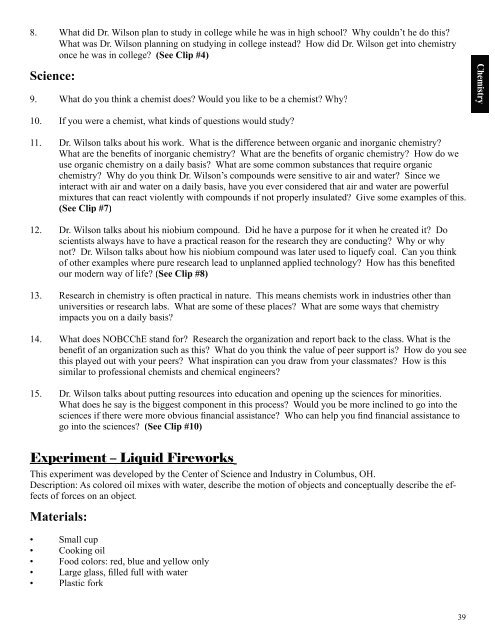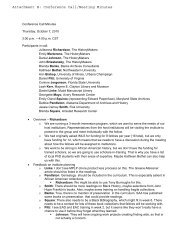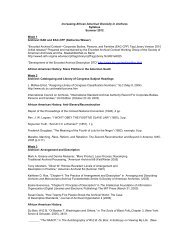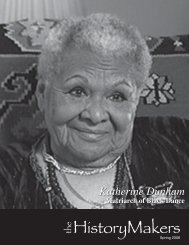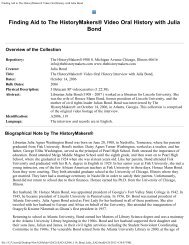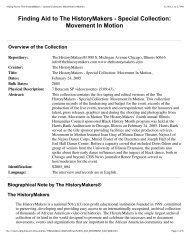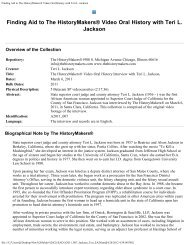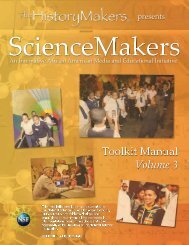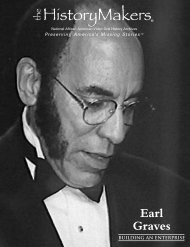ScienceMakers Toolkit Manual - The History Makers
ScienceMakers Toolkit Manual - The History Makers
ScienceMakers Toolkit Manual - The History Makers
You also want an ePaper? Increase the reach of your titles
YUMPU automatically turns print PDFs into web optimized ePapers that Google loves.
8. What did Dr. Wilson plan to study in college while he was in high school? Why couldn’t he do this?<br />
What was Dr. Wilson planning on studying in college instead? How did Dr. Wilson get into chemistry<br />
once he was in college? (See Clip #4)<br />
Science:<br />
9. What do you think a chemist does? Would you like to be a chemist? Why?<br />
10. If you were a chemist, what kinds of questions would study?<br />
11. Dr. Wilson talks about his work. What is the difference between organic and inorganic chemistry?<br />
What are the benefi ts of inorganic chemistry? What are the benefi ts of organic chemistry? How do we<br />
use organic chemistry on a daily basis? What are some common substances that require organic<br />
chemistry? Why do you think Dr. Wilson’s compounds were sensitive to air and water? Since we<br />
interact with air and water on a daily basis, have you ever considered that air and water are powerful<br />
mixtures that can react violently with compounds if not properly insulated? Give some examples of this.<br />
(See Clip #7)<br />
12. Dr. Wilson talks about his niobium compound. Did he have a purpose for it when he created it? Do<br />
scientists always have to have a practical reason for the research they are conducting? Why or why<br />
not? Dr. Wilson talks about how his niobium compound was later used to liquefy coal. Can you think<br />
of other examples where pure research lead to unplanned applied technology? How has this benefi ted<br />
our modern way of life? (See Clip #8)<br />
13. Research in chemistry is often practical in nature. This means chemists work in industries other than<br />
universities or research labs. What are some of these places? What are some ways that chemistry<br />
impacts you on a daily basis?<br />
14. What does NOBCChE stand for? Research the organization and report back to the class. What is the<br />
benefi t of an organization such as this? What do you think the value of peer support is? How do you see<br />
this played out with your peers? What inspiration can you draw from your classmates? How is this<br />
similar to professional chemists and chemical engineers?<br />
15. Dr. Wilson talks about putting resources into education and opening up the sciences for minorities.<br />
What does he say is the biggest component in this process? Would you be more inclined to go into the<br />
sciences if there were more obvious fi nancial assistance? Who can help you fi nd fi nancial assistance to<br />
go into the sciences? (See Clip #10)<br />
Experiment – Liquid Fireworks<br />
This experiment was developed by the Center of Science and Industry in Columbus, OH.<br />
Description: As colored oil mixes with water, describe the motion of objects and conceptually describe the effects<br />
of forces on an object.<br />
Materials:<br />
• Small cup<br />
• Cooking oil<br />
• Food colors: red, blue and yellow only<br />
• Large glass, fi lled full with water<br />
• Plastic fork<br />
39<br />
Chemistry


